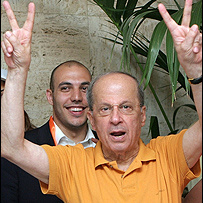Early Rivalry

Lebanon’s by-election was held to gain two seats of a parliament that has not been in session for a long time and by a government which suffers legitimacy crisis.
Although called illegal by Hizbullah and some other parties, the election was held in Metn district. The success of any party is an indicator of the popularity of those who want to contest in presidential elections.
Amin Gemayel, former president of Lebanon vied a candidate supported by Michel Aoun, the head of Free Patriotic Movement. Gemayel was hopeful to defeat Camille Khouri and replace his assassinated son.
But surprisingly the 14th of March ally narrowly (with 500 votes) lost an election which will probably dissuade Gemayel from entering the presidential elections and will cast doubt over the support of the pro-governments.
Lebanon’s political crisis is the aftermath of 33-days war. The opposition has serious complaints against Siniora cabinet’s performance, starting civil disobedience, pulling out their ministers from the cabinet and declaring the government illegal, based on legal issues.
The opposition has asked for the cabinet’s resignation and formation of a national unity government, but the government has resisted the idea with the support of foreign powers and all the intercessions of regional forces to converge the two sides have been futile.
The presidential elections will be held at the end of September this year. The president of Lebanon has to be elected by the vote of two third of the parliament members but the point here is that none of the parties can poll two third of the votes.
According to the law the incumbent president can’t serve another term and in this situation the parliament faces a significant gap.
Therefore in less than two months the political crisis of Lebanon will turn out into a legal vacuum which will paralyze all the involved parties.
The suggested ways to resolve this crisis are as follows:
1. Some believe that the President will use his legal right to announce emergency state and introduce a person as the interim prime minister. In that case Lebanon will have two governments without any president.
Naturally new problems will arise and in that case Lebanon would suffer from violence more than before.
2. Another solution is early parliamentary elections. In that case the president and cabinet will be introduced by the new parliament.
The problem with this solution is that the incumbent government lacks legality to hold the elections. Some suggest formation of a national unity government for a short period to hold the elections.
3. Some observers believe that approaching the legal vacuum point will probably cause more problems and violence, putting both sides under pressure. A tendency to compromise will dominate the political atmosphere at those days and that will cause agreement on two important issues: “national unity government” and “accepted-by-all president”.
Although this may be the best and most practical solution, but due to Americans and Israelis’ reluctance the chance to realize this solution is not too much, as the French attempted for it but failed.
4. The remaining question is what will happen if these suggestions face failure? If Lebanese don’t consider the sensitivity of the situation and reject a compromise, Lebanon will face internal crises and external interference. Of course based on my assessment and what I know from Lebanese leaders and people, the probability of another civil war is far-fetched.

